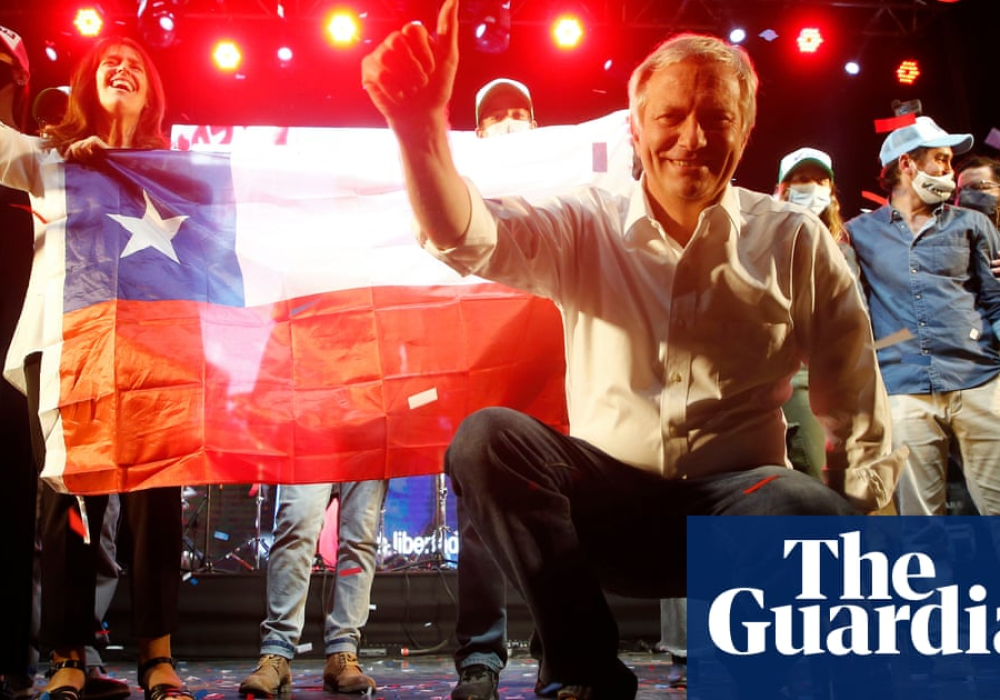Progressive former student leader Gabriel Boric and far-right José Antonio Kast are neck-and-neck ahead of Sunday’s first round
Sun 21 Nov 2021 10.00 GMT
Voters in Chile head to the polls on Sunday in a general election in which the two frontrunners for president offer starkly contrasting visions for the country’s future after two years of street protests and political unrest.
Polls suggest that the progressive former student leader Gabriel Boric, 35, and the far-right candidate, José Antonio Kast, are neck-and-neck ahead of five other candidates – though neither seems likely to cross the 50% threshold needed to avoid a December runoff.
Boric, who shot to prominence during Chile’s 2011 education protests, has promised to “bury” Chile’s past as a cradle of neoliberalism imposed under the dictator Gen Augusto Pinochet, and pledges to build a fairer Chile marked by inclusivity, diversity and liberal social values.
Kast, 55, is a staunch Catholic who opposes abortion and rails against the “gay lobby” – and a proud supporter of the Pinochet dictatorship. A perennial fringe figure in Chilean politics, he has earned support among those who believe Chile needs a firm hand on the rudder after its most turbulent period in decades.
“We are fighting to create a state that guarantees rights and dignity,” Boric told a crowd in the city of Casablanca as he closed his campaign on Thursday evening.
In Santiago, Kast addressed his own supporters, saying: “Chile needs peace, order, and to go back to making progress with freedom.”
The country has tumbled through two years of protests, which began when millions took to the streets in 2019 to voice their frustration at deep inequalities and Pinochet’s lingering legacy of privatised social services.
The demonstrations eventually petered out amid coronavirus quarantines, but they prompted a landmark plebiscite which led to an assembly to rewrite Chile’s constitution, which had been drafted without popular input under Pinochet.
“People will elect the president and congress who will accompany the constitutional process and the transformations undergoing society over the next four years,” said Claudia Heiss, a political scientist at the University of Chile.
“Whoever is elected is going to take those first tentative steps through the transition of the political system.”
In the most open field in years, the middle ground is contested by the centrist Yasna Provoste, the only female candidate and a member of the Diaguita indigenous group, and the centre-right Sebastián Sichel.
“The centre is where the real battle is taking place,” said Heiss. “Both Provoste and Sichel are competing for the moderate vote, which could eventually prove significant in drawing support away from the two frontrunners.”
Sichel has enjoyed something of a resurgence in the week before the vote as Kast has made several blunders after an otherwise smooth campaign.
At a meeting with foreign correspondents a week before the elections, Kast bristled when asked about his team’s fierce criticism of the “far-right” tag he is routinely given.
Kast insisted that he should instead be termed a “commonsense” candidate, but the event made headlines after he reiterated his support for Gen Pinochet’s dictatorship.
Other candidates include the cantankerous communist Eduardo Artés, a primary schoolteacher, and Marco Enríquez-Ominami, a former socialist congressman. He keeps a low profile between elections and is now running for the presidency for a fourth time – having never made the second round.
Another candidate has spent the entire campaign in the United States. Businessman Franco Parisi, repeatedly delayed his return to the country as he has not paid his ex-wife significant sums in child support, which he would have to pay should he return.
If no candidate takes more than half of the vote on Sunday, a run-off next month between the two highest-placed candidates will decide who takes the reins from President Sebastián Piñera in March 2022.
{{topLeft}}
{{bottomLeft}}
{{topRight}}
{{bottomRight}}
{{/ticker}}
{{heading}}
{{#paragraphs}}
{{.}}
{{/paragraphs}}{{highlightedText}}
{{#choiceCards}}{{/choiceCards}}





